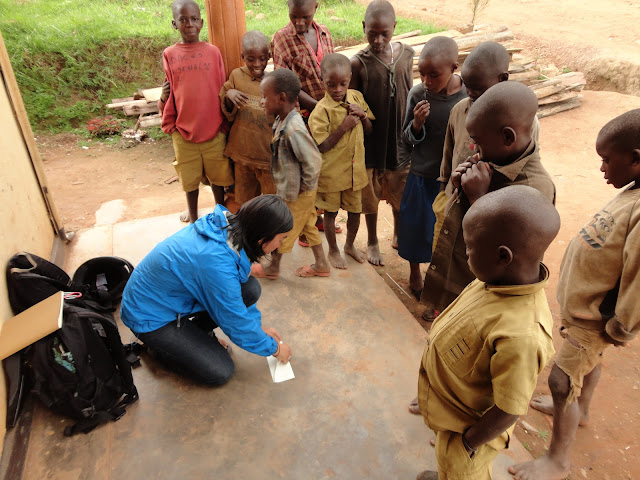Last weekend Deke and I tried to go to the Sorwathe Tea Factory, which is located about 2 hours outside of Kigali. We thought it would be a neat thing to see - the whole tea making process, that is, and so we decided to make the trek out there. Never having been there before, neither of us really knew what to expect. We hopped on Deke's motorcycle, drove for about an hour, and then finally saw the sign that pointed us towards our destination. Seeing that it was 19km away from the main road, we were a little hesitant. Furthermore, we didn't know if the facilities would be open on a Sunday. We approached a group of moto drivers and asked whether or not they knew anything about the tea factory. In their broken English, they assured us that it was open every day, and urged us to continue following the path. 19km of unpaved, rocky road later, we found out that the Sorwathe Tea Factory was in fact
not open. Had this have been the only obstacle during our travels, there would be no story to tell. Fortunately for all you blog readers out there, there
is a story to tell.
Well, like I said, we hopped on the motorcycle early Sunday morning and began making our way to the Tea Factory. All was well, even when we discovered that the 19km from the main road to the factory was unpaved. The drive was quite peaceful - the road was tucked away into the recesses of the city, and there was tea growing to the left and right of us the minute we left the main road. The scenery really was quite amazing.

Every now and then, there were Sorwathe Tea Factory signs counting down the number of kilometers left to go. This was, at times, helpful because it offered a sense of perspective. However, if I am to be honest, it was just downright frustrating, since each kilometer felt like an eternity, due to the speed we were traveling (slightly faster than a snail). In my opinion, the only good that these signs offered us was the knowledge of the exact number of kilometers we had traveled before getting a flat tire. Yep. A flat. The back wheel decided it was time for it to retire after kilometer # 17.
Now, if we were anywhere else - I take that back - if we were in Kigali when this happened, it wouldn't have been a very big deal. Remember how I was describing the peacefulness of the drive? Well, driving in a quiet, secluded area is nice when everything is peachy; it's not really nice when you need to find a mechanic or other vehicle-related supplies (like gas).
Not knowing which way would be best to go, Deke started rolling his bike up the hill. I walked on ahead, in hopes that we would find something - or someone - that could help us. Soon, we had a little entourage, children who had found us in our predicament. In my broken Kinyarwanda, I explained to the children that we had a problem, and asked them where we could find a tire. They, unfortunately, pointed up the hill. Deke, with no other choice, kept pushing his bike. A few minutes later, some older men were walking down the hill. One stopped, probably out of curiosity of why a
muzungo (foreigner) was pushing a moto up the hill. Again, I explained in my broken Kinyarwanda, that we had a problem, and asked him where we could find a tire.
Surprisingly, he left his friends and started walking up the hill with us, in the complete opposite direction from which he was originally heading. He then escorted us to a street that had a few stores and about a dozen or so people. Leaving us behind, he ran to an
alimentation and proceeded to try to locate someone who could help us. Soon, of course, a crowd appeared, as the situation became quite the source of entertainment. Ten minutes later, a man, whom I assume was a mechanic, appeared with some tools in hand. Together with man #1, they pried off the tire from the rim, and discovered the source of the problem: the inner tube was punctured and could not be repaired. After a series of phone calls and some heavy duty brainstorming, man #1 took off with the damaged inner tube to find a replacement.
Knowing that there was really nothing located nearby, and that it could take an hour for the man to return, Deke and I made ourselves comfortable. So, what does one do for one hour in the middle of nowhere, surrounded by locals of all ages? Make the most of the situation! In my case, making the most out of the situation meant teaching the kids how to make paper airplanes. And then having paper airplane contests. Priceless.
About 45 minutes later, sooner than expected, the man returned with a new inner tube! He and the mechanic swiftly replaced the tube, pumped some air into it with a bicycle pump (I kid you not. You can kind of see it in the picture below), and off Deke and I went, completing the last 2km to our destination.
When Deke and I eventually made it to the Sorwathe, it was closed. All that work for nothing! In retrospect, we could have saved ourselves a lot of time, money, and headache, had we not chosen to visit the tea factory that day. But then again, we would have missed out on encountering this group of individuals that will forever be engraved in my heart. I don't know about you, but I do not know many people who would go out of their way to help two strangers in need.











.JPG)


























